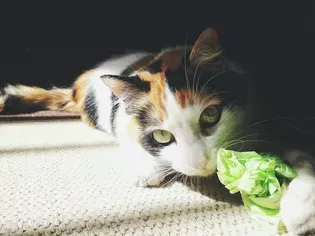Why Cats Eat and Chew on Plastic
Updated on 05/26/24

Why Cats Eat and Chew on Plastic: An Uncovering of Feline Curiosity
Cats, the enigmatic creatures that grace our homes with their charm and affectionate nature, sometimes engage in peculiar behaviors that can leave us perplexed. One such behavior is their tendency to eat or chew on plastic objects. While this may seem odd, there are several reasons why cats engage in this behavior.
1. Pica: The Craving for Non-Food Items
Pica is a condition that affects both humans and animals and is characterized by the persistent eating of non-food items. In cats, pica can manifest itself in the consumption of plastic, fabric, wool, and other objects that are not typically part of their diet. While the exact cause of pica in cats is unknown, it is believed to be related to nutritional deficiencies, gastrointestinal issues, or behavioral problems.
2. Dental Issues: Seeking Relief from Pain
Dental problems, such as gingivitis, periodontitis, and tooth decay, can cause cats discomfort and pain. Chewing on plastic objects can provide temporary relief from this pain by stimulating the gums and massaging the teeth. However, it is important to note that chewing on plastic will not resolve the underlying dental issue and can actually worsen the condition.
3. Boredom: A Search for Stimulation
Boredom is a common cause of pica in cats. When cats are not provided with sufficient mental or physical stimulation, they may resort to eating or chewing on objects to occupy themselves. Providing interactive toys, scratching posts, and ample play sessions can help to prevent boredom and reduce the likelihood of plastic chewing.
4. Gastrointestinal Upset: Attempting to Induce Vomiting
Cats that are experiencing gastrointestinal upset may chew on plastic in an attempt to induce vomiting and relieve their discomfort. Vomiting can help to remove toxins or undigested food from the stomach, but it is important to address the underlying cause of the gastrointestinal issue rather than relying on plastic chewing as a solution.
5. Stress or Anxiety: Finding Comfort in Unusual Ways
Stress or anxiety can trigger pica in cats. When cats feel stressed or anxious, they may engage in unusual behaviors, such as chewing on plastic objects, to comfort themselves. Identifying and addressing the source of stress, such as moving, changes in routine, or environmental stressors, can help to reduce the likelihood of plastic chewing.
Examples of Cats Eating and Chewing on Plastic:
* Case 1: A six-year-old male cat named Max had a history of pica and was frequently found chewing on plastic toys and bags. Max's pica was determined to be caused by a combination of nutritional deficiencies and behavioral problems.
* Case 2: A four-year-old female cat named Luna was diagnosed with gingivitis. Luna chewed on plastic objects to relieve the discomfort caused by her dental pain. Regular dental cleanings and pain medication helped to resolve Luna's pica.
* Case 3: A nine-year-old male cat named Oscar was found to be chewing on plastic bags and other objects when left alone for extended periods of time. Oscar's pica was determined to be a result of boredom and lack of stimulation. Providing Oscar with more toys and interactive play sessions helped to reduce his plastic chewing.
Conclusion
Cats eat and chew on plastic for a variety of reasons, including pica, dental issues, boredom, gastrointestinal upset, and stress or anxiety. Understanding these underlying causes can help us to address and prevent this behavior in our feline companions. It is important to seek veterinary attention if your cat exhibits persistent plastic chewing, as it may indicate an underlying medical or behavioral issue that requires treatment.
Explore More Pets

Cat Behavior Problems
How to Stop Aggression in Kittens

Long-Haired Cat Breeds
Siberian Cat: Breed Profile, Characteristics, & Care

Cat Behavior Problems
How to Stop Kittens From Scratching and Biting

Long-Haired Cat Breeds
Turkish Angora: Cat Breed Profile, Characteristics & Care

Basic Training
How to Socialize Your Kitten

Short-Haired Cat Breeds
Cute Pictures & Facts About Calico Cats & Kittens

Litter Box Training
Training Your Kitten to Use the Litter Box

Long-Haired Cat Breeds
10 Fun Facts About White Cats
